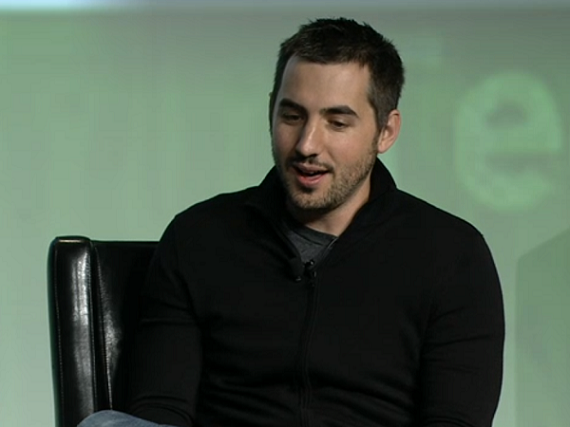
At the TC Disrupt conference in San Francisco Tuesday, Digg co-founder Kevin Rose discussed his new life as a partner at Google Ventures, and refused to take the bait into trashing Y Combinator founder Paul Graham. He also shared the best, and worst, advice he’s ever gotten.
While Rose says that he was doing angel investing for at least three years before joining Google Ventures, he is enjoying getting to see more companies than he previously did. Instead of just casually investing every month or so, he now gets to see 1o or 15 companies a week.
“It kind of plays to my ADD brain in a way, like I always like seeing cool new ideas. And so, the fact that I get to play in a little bit of a bunch of different things is a lot of fun.”
When asked about a memo leaked last week, in which Y Combinator founder Paul Graham accused Google Ventures of low-balling on valuations, Rose was adamant that this was not true.
“We’re absolutely not going out there any trying to lowball these companies,” he said.
Not all companies are the same, he said. Some may be worth $20 million, others might be worth $4 million.
“You can’t just automatically say that every company that graduates from Y Combinator is a $10 million company.”
Google Ventures has a $200 million fund every year, Rose said, so the little bit that would be saved doesn’t matter that much.
Still, Rose refused to say anything bad about Graham.
“I have nothing bad to say about Y Combinator. I think what they’re doing is great. They’re obviously producing great companies,” Rose said.
“Obviously this was an internal e-mail that was meant to stay internal and it just got leaked. Nobody’s mad at anyone.”
Later in the interview, Rose was asked by a member of the audience what Google gets out of venture activity besides financial return, Rose made sure to clarify that Google Ventures does not make investments in companies that will necessarily fit with Google.
“We kind of believe that if you’re doing something great for start-ups, and for the general Internet ecosystem, the rising tide lifts all boats.”
Google Ventures can even fund a startup that will compete with Google.
Best and worst advice
The best advice Rose said he ever got was from Jack Dorsey, creator of Twitter and the founder and CEO of Square: edit your team.
You will hire bad people, Rose said, and you always need to making sure that the people on your team are on the same page as you, and if not, you need to let them go, for both their sake and yours.
When it came to the worst piece of advice he’d ever gotten, Rose talked about the possible problems with giving up control of a company you are the founder of.
“It’s very easy when you’re first starting out as a younger entrepreneur in your early 20s, and you’ve never done this before, to say, ‘I don’t think I can be the CEO and I want to give control of my business to someone else.’”
While Rose prefaced by saying that he was not talking about Digg, he then mentioned former Digg CEO Jay Adelson, who Rose says did some good things, “but you have to realize when you’re giving away control of your business to someone else, like, even though you’re still the founder, you’re actually giving them the power to make a lot of decisions in your company.”
Giving up control of the company is not something to take lightly, he said.


















